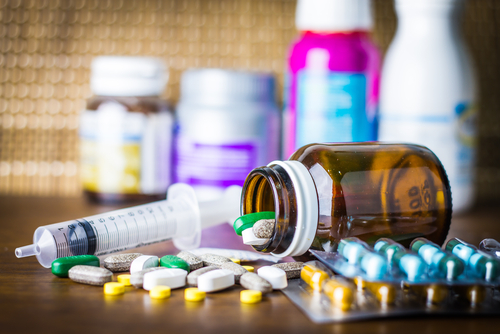Penalties for Giving Away Prescription Drugs in New Jersey
September 10, 2021

New Jersey is strict when it comes to drug possession or distribution. These laws not only cover hard drugs but also prescription drugs.
Can You Give Away Prescription Drugs?
It’s illegal to give prescription drugs to another person in New Jersey. It’s also illegal for someone to have possession of, or use, a drug in which they do not have a prescription. The simple behavior of giving away prescriptions, or possession of them, is illegal and does not require that you sell or buy the drugs to be punishable.
Types of Prescription Drug Offenses in New Jersey
There are numerous drug offenses that you can be charged with for giving away prescription drugs in New Jersey. These crimes may be considered a misdemeanor, or disorderly persons offense, or a felony. Disorderly persons offenses carry lower sentences, but can still lead to required jail time or community service. A felony is harsher, often leading to jail time and a permanent criminal record.
Potential Consequences for Prescription Drugs in New Jersey
If you are charged with giving away prescription drugs, you may receive the following consequences:
- Possession, distribution, or intent to distribute prescription drugs in the amount of 5-99 pills: This is a third-degree crime, which can lead to $200,000 in fines and prison up to five years.
- Possession, distribution, or intent to distribute prescription drugs in the amount of 100 pills or more: This is a second-degree crime, which can lead to $300,000 in fines and prison up to 10 years.
- Using forgery to obtain possession of a prescription drug: This is a fourth-degree crime, which can lead to $10,000 in fines and up to 18 months in prison.
- Possession of a prescription drug of four or fewer pills: This is a disorderly persons offense, which can lead to $1,000 fines and up to 6 months in jail.
A lot goes into the sentencing of prescription drug possession or distribution. Other factors that the court may consider are whether or not you have any prior drug offenses, the type of medication, the number of pills, and your intent with them. Prescriptions are categorized into different schedules, with Schedule II drug possession and distribution leading to more severe consequences.
A few types of Schedule II drugs may include Adderall or OxyContin. A few Schedule III drugs include Ketamine or Testosterone. A few Schedule IV drugs include Ambien or Ativan. If you were in possession of more than one controlled prescription, it can also lead to harsher consequences. Of course, this isn’t a complete list of prescriptions or their classes. Most prescription drugs that are controlled fall into one of the schedules.
Additionally, prison time may not be the only consequence. The court may also order community service, parole, or required attendance in a drug or rehab center. Certain drug crimes can also make it difficult to work in certain careers or to hold a professional licensee. You may also find that drug charges affect your ability to receive federal loans for college education.
Contact an Experienced Marlton Drug Defense Attorney About Your Prescription Drug Crime Charges in New Jersey
Have you been charged with a drug-related offense in New Jersey? A drug crime conviction can carry with it heavy fines, jail time, and driver’s license suspension! That is why it is imperative that you speak with a qualified criminal defense lawyer about your case. The Law Office of John B. Brennan represents clients charged with use, possession, production, distribution, and related drug offenses in Marlton, Moorestown, Pennsauken, Mt. Laurel, and throughout New Jersey. Call (856) 446-5123 or fill out our confidential online form to schedule a consultation about your case. We have an office located at 10,000 Lincoln Dr. East, Suite 201, Marlton, NJ 08053.
The articles on this blog are for informative purposes only and are no substitute for legal advice or an attorney-client relationship. If you are seeking legal advice, please contact our law firm directly.
